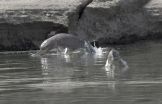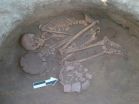(Press-News.org) Forest cover in Borneo may have declined by up to 30% over the past 40 years, according to a study published July 16, 2014 in the open-access journal PLOS ONE by David Gaveau from the Center for International Forestry Research, Indonesia, and colleagues.
The native forests of Borneo have been increasingly impacted by logging, fire, and conversion to plantations since the early 1970s. Borneo lacks island-wide forest clearance and logging documentation, making forest conservation planning difficult, especially for selectively logged forests that have high conservation potential but are vulnerable to being converted to plantations. To better understand long-term forest cover and logging patterns, the researchers in this study analyzed LANDSAT satellite images from 1973 to 2010.
The authors found that in the early 1970s, ~75% of Borneo was forested, and from 1973 to 2010, the forest area declined by ~30%, which is nearly twice as fast as a rate compared to the rest of the world's humid tropical forests. The authors also analyzed images of over 270,000 km of logging roads built from 1973 to 2010 and estimated that over 266,000 km2 of forest cover has been logged, with logging reaching increasingly more remote and high-elevation forests over time. Over 389,000 km2 of Borneo remains either completely or partially forested, and the authors hope that understanding forest change patterns may aid in future conservation planning, particularly in selectively logged forests.
INFORMATION:
In your coverage please use this URL to provide access to the freely available paper: http://dx.plos.org/10.1371/journal.pone.0101654
Citation: Gaveau DLA, Sloan S, Molidena E, Yaen H, Sheil D, et al. (2014) Four Decades of Forest Persistence, Clearance and Logging on Borneo. PLoS ONE 9(7): e101654. doi:10.1371/journal.pone.0101654
Funding: This work was funded by the Arcus foundation and the CGIAR Research Program on Forests, Trees, and Agroforestry. The funders had no role in study
design, data collection and analysis, decision to publish, or preparation of the manuscript.
Competing Interest: The authors have declared that no competing interests exist.
Borneo deforested 30 percent over past 40 years
Deforestation patterns may provide insight for future conservation
2014-07-16
ELSE PRESS RELEASES FROM THIS DATE:
Whale shark fringe migration
2014-07-16
At the fringe of the whale shark range, the volcanic Azore islands may play an increasing role for the north Atlantic population as sea surface temperatures rise, according to a study published July 16, 2014 in the open-access journal PLOS ONE by Pedro Afonso from University of the Azores and colleagues.
Whale sharks prefer tropical waters in the range of 26-30º C, but studies have shown that this large filter-feeding shark seasonally aggregates at highly productive coastal sites, sometimes at the edge of their preferred water temperature range. Whale sharks have been ...
Indus river dolphin's declining range
2014-07-16
Removal of river water for irrigation and habitat fragmentation by irrigation dams were shown to be the principal factors contributing to the decline of the Indus river dolphin, according to a study published July 16, 2014 in the open-access journal PLOS ONE by Gill Braulik from the Wildlife Conservation Society and University of St. Andrews and colleagues.
Many freshwater marine mammals are endangered due to rapidly degrading habitat and conservation of these megafauna species depends on maintaining intact habitat. This study used historical range data and information ...
Transplanting gene into injured hearts creates biological pacemakers
2014-07-16
LOS ANGELES (STRICTLY EMBARGOED UNTIL 2 P.M. EDT ON JULY 16, 2014) – Cardiologists at the Cedars-Sinai Heart Institute have developed a minimally invasive gene transplant procedure that changes unspecialized heart cells into "biological pacemaker" cells that keep the heart steadily beating.
The laboratory animal research, published online and in today's print edition of the peer-reviewed journal Science Translational Medicine, is the result of a dozen years of research with the goal of developing biological treatments for patients with heart rhythm disorders who currently ...
Sexual harassment and assault are common on scientific field studies, survey indicates
2014-07-16
CHAMPAIGN, Ill. — A survey of 142 men and 516 women with experience in field studies in anthropology, archaeology, geology and other scientific disciplines reveals that many of them – particularly the younger ones – suffered or witnessed sexual harassment or sexual assault while at work in the field.
A majority of the survey respondents (64 percent) said they had experienced sexual harassment (inappropriate sexual remarks, comments about physical beauty or jokes about cognitive sex differences, for example). And more than 20 percent reported they had been the victims ...
Potassium supplements may increase survival in patients taking diuretics for heart failure
2014-07-16
PHILADELPHIA—Researchers from the Perelman School of Medicine at the University of Pennsylvania found that patients taking prescription potassium supplements together with loop diuretics for heart failure have better survival rates than patients taking diuretics without the potassium. Moreover, the degree of benefit increases with higher diuretic doses. The team, including senior author Sean Hennessy, PharmD, PhD, associate professor of epidemiology in Penn's Center for Clinical Epidemiology and Biostatistics (CCEB), report their findings in a study published online July ...
Preeclampsia may share cause with disorders such as Alzheimer's
2014-07-16
New research has identified a potential cause of and a better diagnostic method for preeclampsia, one of the most deadly and poorly understood pregnancy-related conditions in the world. The international team, led by researchers at Nationwide Children's Hospital, discovered that the disease may result from a collection of protein mishaps like those associated with Alzheimer's disease. Their findings, released today by Science Translational Medicine, have already led to an affordable, fast and accurate urine test that could revolutionize the diagnosis of preeclampsia in ...
Walking on all fours is not backward evolution, study shows
2014-07-16
VIDEO:
This video is a sample of UTS walking patterns.
Click here for more information.
AUSTIN, Texas -- Contradicting earlier claims, "The Family That Walks on All Fours," a group of quadrupedal humans made famous by a 2006 BBC documentary, have simply adapted to their inability to walk upright and do not represent an example of backward evolution, according to new research by Liza Shapiro, an anthropologist at The University of Texas at Austin.
Five siblings in the family, ...
New study links dredging to diseased corals
2014-07-16
In a world-first study published today, researchers say dredging activity near coral reefs can increase the frequency of diseases affecting corals.
"At dredging sites, we found more than twice as much coral disease than at our control sites," says the lead author of the study, Joe Pollock, a PhD candidate from the ARC Centre of Excellence for Coral Reef Studies (Coral CoE) at James Cook University (JCU) and the Australian Institute of Marine Science (AIMS).
"Corals require both light and food to survive," Pollock explains. "And unfortunately, dredging impacts corals ...
Tooth plaque provides unique insights into our prehistoric ancestors' diet
2014-07-16
This news release is available in French. This news release is available in French. This news release is available in French.
An international team of researchers has found new evidence that our prehistoric ancestors had a detailed understanding of plants long before the development of agriculture.
By extracting chemical compounds and microfossils from dental calculus (calcified dental plaque) from ancient teeth, the researchers were able to provide an entirely new perspective on our ancestors' diets. Their research suggests that purple nut sedge (Cyperus ...
Tooth plaque provides insight into our prehistoric ancestors' diet
2014-07-16
A new study may provide evidence that our prehistoric ancestors understood plant consumption and processing long before the development of agriculture, according to a study published July 16, 2014 in the open-access journal PLOS ONE by Stephen Buckley from University of York and colleagues.
Evidence of plant consumption before the adoption of agriculture is difficult to find; such evidence is meaningful for understanding how much prehistoric people knew about the ecology and potential therapeutic properties of plants. Scientists in this study extracted and analyzed chemical ...
LAST 30 PRESS RELEASES:
Mayo Clinic study finds single dose of non-prescribed Adderall raises blood pressure and heart rate in healthy young adults
Engineered immune cells show promise against brain metastases in preclinical study
Improved EV battery technology will outmatch degradation from climate change
AI cancer tools risk “shortcut learning” rather than detecting true biology
Painless skin patch offers new way to monitor immune health
Children with poor oral health more often develop cardiovascular disease as adults
GLP-1 drugs associated with reduced need for emergency care for migraine
New knowledge on heritability paves the way for better treatment of people with chronic inflammatory bowel disease
Under the Lens: Microbiologists Nicola Holden and Gil Domingue weigh in on the raw milk debate
Science reveals why you can’t resist a snack – even when you’re full
Kidney cancer study finds belzutifan plus pembrolizumab post-surgery helps patients at high risk for relapse stay cancer-free longer
Alkali cation effects in electrochemical carbon dioxide reduction
Test platforms for charging wireless cars now fit on a bench
$3 million NIH grant funds national study of Medicare Advantage’s benefit expansion into social supports
Amplified Sciences achieves CAP accreditation for cutting-edge diagnostic lab
Fred Hutch announces 12 recipients of the annual Harold M. Weintraub Graduate Student Award
Native forest litter helps rebuild soil life in post-mining landscapes
Mountain soils in arid regions may emit more greenhouse gas as climate shifts, new study finds
Pairing biochar with other soil amendments could unlock stronger gains in soil health
Why do we get a skip in our step when we’re happy? Thank dopamine
UC Irvine scientists uncover cellular mechanism behind muscle repair
Platform to map living brain noninvasively takes next big step
Stress-testing the Cascadia Subduction Zone reveals variability that could impact how earthquakes spread
We may be underestimating the true carbon cost of northern wildfires
Blood test predicts which bladder cancer patients may safely skip surgery
Kennesaw State's Vijay Anand honored as National Academy of Inventors Senior Member
Recovery from whaling reveals the role of age in Humpback reproduction
Can the canny tick help prevent disease like MS and cancer?
Newcomer children show lower rates of emergency department use for non‑urgent conditions, study finds
Cognitive and neuropsychiatric function in former American football players
[Press-News.org] Borneo deforested 30 percent over past 40 yearsDeforestation patterns may provide insight for future conservation



